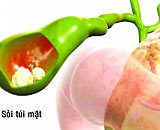People with gallstones should limit their intake of fats, as these substances can affect the liver, gallbladder, and stomach functions. Consuming too much fat leads to irregular bile flow into the intestines, stimulating the gallbladder to contract excessively, which can contribute to the formation of stones along with cholesterol.
 |
|
(Image: SK & DS) |
Gallstones are more common in women than in men and tend to increase with age. The causes of gallstones include chronic cholecystitis, bile stasis, and infections of the gallbladder. Constipation also provides an opportunity for intestinal bacteria to thrive, leading to inflammation of the duodenum, gallbladder, and bile ducts, making it easier for bile to settle into stones. There are two types of gallstones:
Pigment stones: These are less common.
Cholesterol stones: These are often associated with high blood cholesterol levels. Cholesterol can easily form stones, especially when accompanied by other fats, which is commonly linked to obesity. According to research from the University of Kentucky (USA), obesity is a significant risk factor for gallbladder disease. A 15-year follow-up study showed that 3,200 out of 42,000 obese women required gallstone surgery. Individuals with a waist circumference greater than 91.5 cm are twice as likely to need gallstone surgery compared to those with a waist circumference below 66 cm.
In Vietnam, a study from Viet Duc Hospital found that nearly 42% of gallstone patients are obese.
What should gallstone patients eat?
Reduce fats: It is necessary to limit cholesterol-rich foods such as organ meats and eggs…
Increase protein to boost damaged liver cell regeneration and combat fatty liver degeneration.
Rich in carbohydrates: These foods are easy to digest and do not negatively impact bile. Additionally, high fiber content helps improve digestion and prevent constipation.
Rich in vitamin C and B vitamins (to increase fat and carbohydrate metabolism). Fresh vegetables and fruits are highly beneficial.
The ratio of macronutrients (protein, fat, carbohydrates) for a normal adult is 1/0.75/5, while for someone with gallstones, it should be 1/0.5/5.
Foods to avoid: Tea, coffee, cocoa, chocolate; fatty meats and fish, palm oil, coconut oil, organ meats. Limit egg yolks.
Recommended foods: Fruit juices, fresh fruits of all kinds, fresh vegetables, sweets with little egg or butter, lean meats such as pork loin, beef, snakehead fish, carp, and various legumes like soybeans, green beans, and black beans. Additionally, some foods that promote bile production, such as turmeric and lime leaves, can be included.
To stimulate gentle gallbladder contractions, small amounts of easily digestible fats like butter or raw herbal oils, along with chicken or duck fat, can be used.

















































